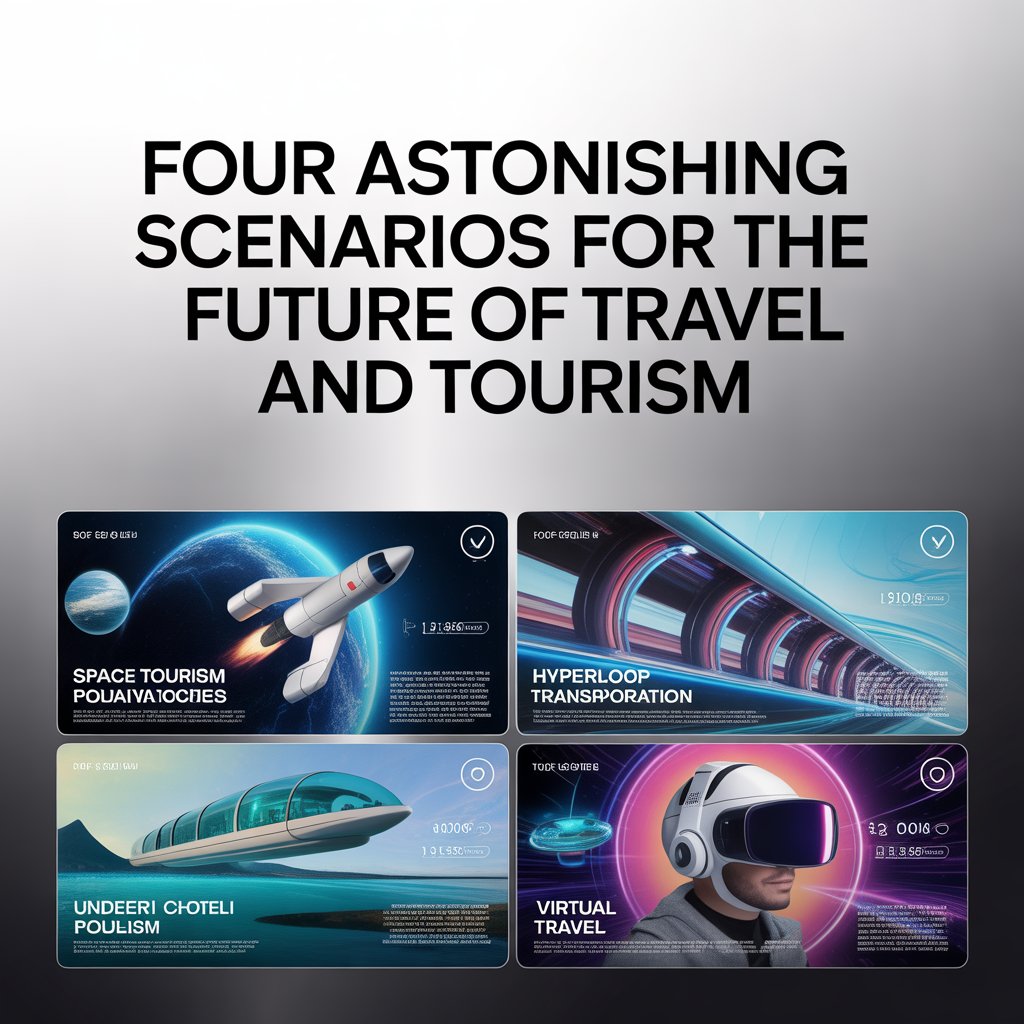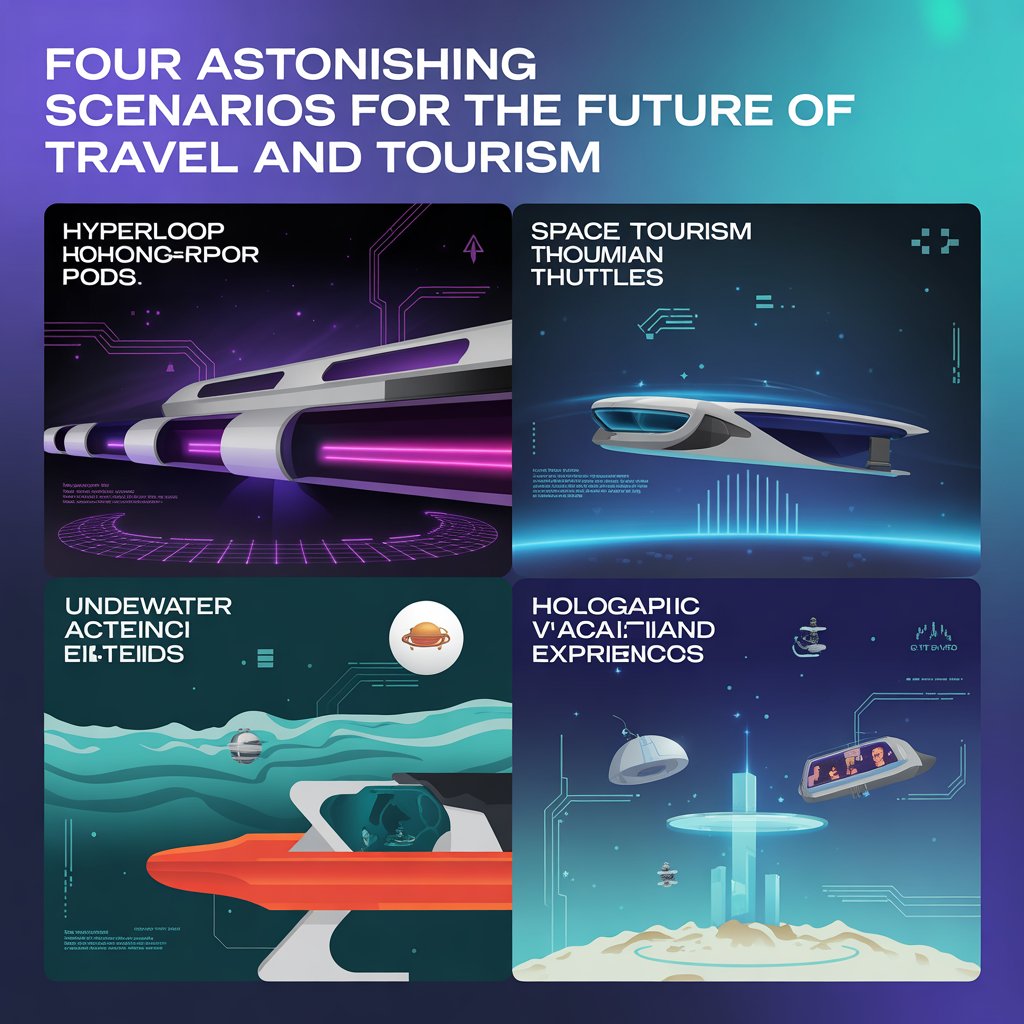Introduction: Travel and Tourism
Just imagine the world in which your passport is a digital file, your destination a floating eco-city and your travel guide is an AI who would know you even better than you know yourself. The travel and tourism industry is standing at the edge of a revolution, with technology, environmental consciousness and human need of in-depth contact with the world.
To people who follow news in the global traveling, it is evident that we are not going back to what used to be the pattern even before the pandemic. We’re leaping into a new era. This paper explores the four fascinating, plausible possibilities of the way in which we view our beautiful planet. We will travel to the old temples of Greece to the neon-lit streets of Japan to turn them into living experimentation of what the future of the world might be.
Be curious, that is why you should pack a suitcase. We shall see what the possibilities are.

Scenario 1: The Hyper-Personalized, Digitally-Enhanced Journey
There is no place in this future that package holidays that fit all are a thing of the past. It is no longer about selling trips; it is about having a deeply personal experience that will be driven by data and artificial intelligence.
How It Works:
Your digital assistant connected to your health data, social media preferences, and past travel history would have suggested destinations you would not have thought of before you even have a thought about where to go. And would you like a hiking trail in Greece of just the right difficulty and ending with a personal dinner prepared by a local chef who will tailor the menu to your needs? Done.
The system has already taken into consideration the fact that you liked looking at the sunset and ancient history.
This hyper-personalization is continued in the trip. The glasses of Augmented Reality (AR) display historical information on the ruins, real-time menu translation, and marks the most favorable photo locations depending on your sense of beauty. In such a location as Kyoto, Japan, you could stroll through a busy temple yard and have it virtually rebuilt to its Heian-period splendor, with computer-generated court nobles passing by.
The Role of Destinations: Japan and Greece
Japan: Japan is already a technological leader, and she is well-placed to be the first. Think about robots that will manage hotel check-ins, AI concierges that will book real-time hotel rooms, and AR experiences that will allow seeing samurai history in the modern Tokyo districts.
Greece: The Greek mythology and history is a great canvas to use AR. Tourists were able to experience the Battle of Thermopylae on the real terrain or even find mythological animals in the snow-forests of Mount Olympus, which made the process of learning a very immersive one
The Human Touch:
Critics worry this could make travel sterile, but the goal is the opposite. By handling all the logistics and friction points, technology frees travelers to engage more meaningfully with the moment and the people around them. The digital layer enhances the physical experience; it doesn’t replace it.
Scenario 2: The Regenerative and Purpose-Driven Voyage
This scenario responds directly to the climate crisis. Travelers move beyond “leaving no trace” to actively “making things better.” The core question shifts from “Where can I go?” to “How can I help?”
Add Your The Core Ethos:
Travel becomes an agent of good. Tourists give their volunteer time, skills, and money to conservation projects, help in scientific research, or invest directly in the community owned businesses. Carbon footprints are not only compensated but also included in a regenerative calculation, in which a journey is an active part of the process of reforestation, restoring corals, or clean energy initiatives.
Carbon-positive travel becomes the gold standard. A flight’s emissions are calculated, and the traveler’s fee ensures that twice that amount of carbon is sequestered or avoided.
How Japan and Greece Adapt:
Greece: Greece has a weak island ecosystem and an exposed coastline, which could make it a regenerative travel and tourism hub globally. There are the activities that travelers may engage in protecting and conserving sea turtles in Zakyntheos, volunteering as citizen scientists during archaeological excavations, or replenishing forests burnt by wildfires.
The resorts would be completely off-grid, made up of solar and desalination plants, and their choices would be made using hyper-local and sustainable agriculture.
Japan: The key aspect of this model may be the Japanese understanding of living in balance with the mountain and forest, the so-called Satoyama. The depopulated rural villages may become eco-tourism resorts where visitors may be taught traditional crafts, assist in preserving old forest paths and be involved in rice planting. This puts money in these communities and cultural heritage is preserved.
The Impact on Travel News:
Travel news media in this future would not simply be about the best 10 beaches but they would be writing about the best 10 rewilding projects to join or they would be interviewing communities which have been brought back to life by conscious tourism. In ecosystems healed and cultures conserved, success is determined.

Scenario 3: The Micro-Academy and Skill-Based Retreat
What would happen to your next vacation, and it not only was a relaxing activity but also a fundamental upgrade to your skill set? This situation is the combination of travelling and deep, immersive learning. The vacation is turned into a sabbatical, a retreat, or a kind of apprenticeship.
Beyond the Cooking Class:
Rather than a one-day pasta-making course in Italy, the traveler could take three weeks on an agriturismo, which would teach them the whole process of farm-to-table food, including how to harvest wheat and mill flour, how to make local pasta shapes and sauces. This is profound, gradual, artful travelling.
Such micro-academies would be hosted by the masters of their trade a great potter in Crete, a great sake brewer in Kyoto, or a great martial arts sensei in Okinawa. It is about mastery, affiliation and bringing a practical skill home.
A Natural Fit for Cultural Hubs:
Japan: This is quite natural to Japan. The respect of the country towards mastery (shokunin kishitsu) makes it perfect in retreats, which are based on skills. Imagined: exhaustive classes of samurai swordmanship, old-fashioned woodworking (kumiki), ikebana (arranging flowers), or even anime and manga production by professionals in the industry.
Greece: The birth of philosophy and drama might have both mental and practical retreats. Philosophy is following in the footsteps of Socrates, playwriting-workshops in a classical amphitheater at Epidaurus or cruising voyages which would educate them in the art of the heavens as the ancient Greeks did.
The New Traveler Profile:
This appeals to a group of people who want more than a tan. They are inquisitive, life long learners who want to redefine themselves or get a hobby that is rich. The souvenir does not come as a trinket but as a new capability.
Scenario 4: The Nomadic Hub and the Work from Anywhere Revolution.
The digital nomad is the new generation of traveler caused by the permanent transition to remote working. This is the situation where trend exploding, where whole cities and nations turn out to become smooth centers of these itinerant contemporary.
The Infrastructure of a Nomadic Hub:
These aren’t just cities with good Wi-Fi. They are completely re-engineered for the long-term, working visitor. We’re talking about:
Co-living and co-working spaces that are architecturally stunning and community-focused.
Simplified, long-term digital nomad visas with integrated health insurance and tax systems.
“Digital Port” facilities at airports with soundproof pods and high-speed connectivity for arriving professionals.
Community events and networking specifically designed to integrate nomadic workers into the local fabric.
The Competition Heats Up:
Here will be intense rivalry between countries in terms of winning over this desirable demographic which spends a lot. Which nation has introduced the most attractive nomad visa or created the most stunning co-working center will take up the latest travel news.
The Ripple Effect:
This situation might culminate into a more dispersed global labor force and a colossal economic enhancement of the accommodating destinations. Nonetheless, it is also accompanied by such issue as possible gentrification and necessary balance between nomadic population and local citizens.

Summary: The Future is a Choice.
These four Hyper-Personalized, Regenerative, Skill-Based, and Nomadic are not exclusive to each other. The aspects of all will probably intertwine and develop, influenced by the technological advances, environmental conditions, and, above all, our personal decisions as travelers.
The future of travel and tourism is not an incident that just occurs to us. It is something that we create on each and every choice we make: where we visit, what companies, and where we leave our footprint. Is it technology that we shall use to make a deeper connection or deeper isolation? And will we go to eat or to toil?
We should be active players as we create this new world as we observe travel news unfolding in Japan to Greece and other places. We need to demand better, make better decisions and travel to places with purpose, wonder and responsibility. The exploration chapter which follows is yet to be penned and we are all the pens.